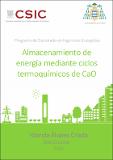Por favor, use este identificador para citar o enlazar a este item:
http://hdl.handle.net/10261/143057COMPARTIR / EXPORTAR:
 SHARE
BASE SHARE
BASE
|
|
| Visualizar otros formatos: MARC | Dublin Core | RDF | ORE | MODS | METS | DIDL | DATACITE | |

| Título: | Almacenamiento de energía mediante ciclos termoquímicos de CaO |
Otros títulos: | Termochemical energy storage by CaO cycles | Autor: | Álvarez Criado, Yolanda CSIC ORCID | Director: | Abanades García, Juan Carlos CSIC ORCID; Alonso Carreño, Mónica CSIC ORCID | Fecha de publicación: | dic-2016 | Resumen: | [EN] During the last century, the sharp increase in greenhouse gases emissions due to the use of fossil fuels as main energy source in most of the global economies was the main factor responsible for climate change. Therefore, the progressive adoption of new energetic mixes with reduced greenhouse gas emissions and a more effective use of available energy resources are considered essential for tackling climate change. The use of high-temperature (>400ºC) thermal or thermochemical energy storage technologies has been presented as a suitable solution since it would contribute to increasing the energy efficiency, favour the flexibility of conventional energy production systems and facilitate the development of intermittent renewable energies by establishing a temporal bridge between energy demand and supply. Despite the significant advantages of the high temperature energy storage systems, they have not been developed to a state-of-the-art level on a large scale. Therefore, the main objective of this Thesis has been to contribute to the study and development of newly energy storage systems based on the use of reversible reactions at high temperature using CaO. The work developed within the framework of this Thesis is focused on the use of the carbonation/calcination of CaO/CaCO3, and hydration/dehydration of CaO/Ca(OH)2 as energy storage systems in conventional combustion systems and in concentrated solar power plants respectively. Conceptual design studies of the new energy storage systems as well as reactor modelling (validated against experimental results from pilot plants) and the evaluation of CaO materials for their practical use have been conducted. Two main research paths, that share certain similarities, are followed in this Thesis. Firstly, the use of energy storage systems for conventional combustion processes using fluidized bed combustors (with or without integrated CO2 capture systems) is studied at a conceptual level. These energy storage systems are presented as an economic and competitive alternative in highly flexible energy markets. Basic designs have been proposed and the related mass and heat balances solved. Secondly, the hydration and dehydration reactions of CaO and Ca(OH)2 have been studied in-depth for use in concentrated solar power systems to allow a more stable energy production of this inherent intermittent renewable energy. Studies at a conceptual level as well as reactor models have been developed using fluidized bed reactors for the hydration/dehydration reactions as the key element of the energy storage system. The reactor models have been compared and validated against experimental results obtained from pilot plant tests performed under operation conditions relevant to the large scale application of this energy storage system. The final section of this Thesis investigates CaO/Ca(OH)2-based materials (both natural and synthesized) for their use over hundreds of charge and discharge cycles. The chemical and mechanical properties of different CaO/Ca(OH)2-based materials have been studied in-depth to test for reactivity/reversibility and crushing strength/attrition resistance, respectively. | Descripción: | Tesis doctoral presentada en el Departamento de Energía de la Universidad de Oviedo, diciembre de 2016 | URI: | http://hdl.handle.net/10261/143057 |
| Aparece en las colecciones: | (INCAR) Tesis |
Ficheros en este ítem:
| Fichero | Descripción | Tamaño | Formato | |
|---|---|---|---|---|
| TD_Alvarez_Criado_Yolanda.pdf | 35,39 MB | Adobe PDF |  Visualizar/Abrir |
CORE Recommender
Page view(s)
229
checked on 18-abr-2024
Download(s)
353
checked on 18-abr-2024
Google ScholarTM
Check
NOTA: Los ítems de Digital.CSIC están protegidos por copyright, con todos los derechos reservados, a menos que se indique lo contrario.
